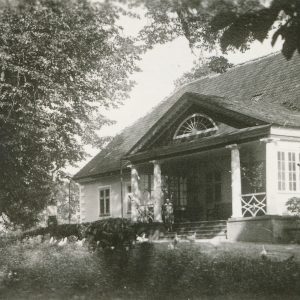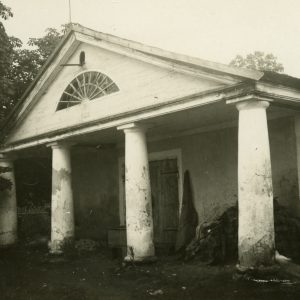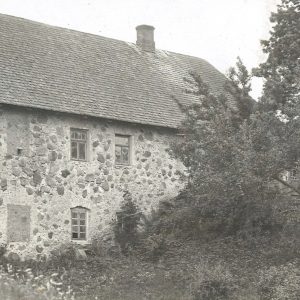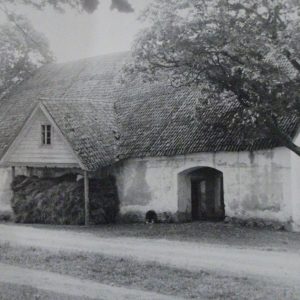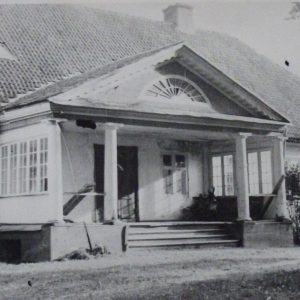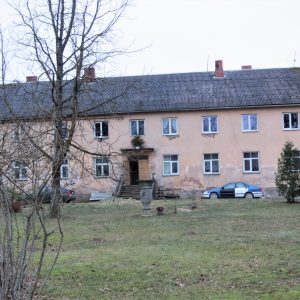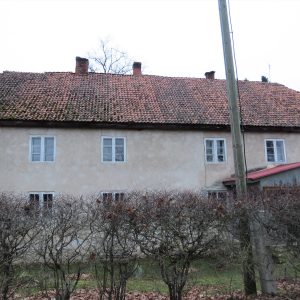Baižkalns Manor Estate
Presumably, Baižkalns Manor Estate developed in late 17th century by separating it from Rauna Castle Manor at the site, where the house of Baižas was situated. The manor estate was founded by Rauna Castle Manor manager Friedrich. Initially, Baižkalns Manor Estate was a crown manor estate or an estate under direct administration of the Russian Empire.
The house of Baižkalns Manor Estate landlord was built in the first part of the 19th century at the time, when the owner of the manor estate was Johann Bernhart van Zuckerbecker. It was built in classicism style with tile roof, a glass verandah and four columns. In the 60s of the 20th Century, the landlord’s house was rebuilt, the second floor was added by adapting the building for the functions of an apartment house. Apart from the landlord’s house, the complex of Baižkalns manor estate buildings included the manager’s house, stables, a barn, a cellar with a superstructure, a greenhouse, a shed, a wheelwright workshop, a servants’ house, a blacksmith’s shop and a drying barn. Baižkalns Manor Estate was surrounded by a park, however only individual trees and lanes of the park have been preserved. Even today, a decorative vase is seen in front of the landlord’s house of Baižkalns Manor Estate.
In 1900, the area of Baižkalns Manor Estate was 1,006 desyatina or 1,100 ha. Vīķi Semi-manor, a water mill, a brick kiln, a lime kiln, an alcohol distillery with a steam boiler and a school belonged to Baižkalns Manor Estate. A paper factory was also situated within the borders of Baižkalns Manor Estate. It was opened in 1815 by the owner of Baižkalns Manor Estate Bernhard Christian Klein. The factory predominantly produced packaging paper for the packaging of sugar that was produced at Rauna Manor Estate. Later it became the property of merchant Schmidt and writing paper, wrapping paper and filter paper was produced there. Apart from paper factory there was a metal processing factory in the territory of Baižkalns Manor Estate. It was founded in 1830 by merchant Lindenbaum. The factory produced sewing needles, knotting needles, pins, hooks, wire meshes, mouse traps, etc. After the acquisition of independence by Latvia, Baižkalna Manor Estate was divided to peasants and artisans and the land became the property of private owners. During the World War II, German troops were stationed at Baižkalna Manor Estate, they rested and repaired military equipment here. Nowadays, the former territory of Baižkalns Manor Estate belongs to different private owners. After reconstruction, the landlord’s house serves as a multiple-apartment house, while former stables of the manor estate are operated by riding sports club “Baižkalna Staļļi”.
Gallery
Travel objects
- Rauna Castle
- Rauna Castle Courtyard
- Rauna Park and Rauna Manor Estate
- Rauna Evangelic Lutheran Church
- Rauna Agricultural Society House
- Rauna Freedom Monument
- Rauna Mill
- Strads Pub / Rauna Dairy
- Plūme House / Bookshop
- Rauna Parish House
- Rauna Congregation School / Office of Sarkanais Oktobris Collective Farm
- Rauna Devil’s Cave
- Rauna Staburags (Staburags Cliff of Rauna)
- Jānis Cimze Monument
- Rauna “Pārupe” (Left Bank)
- Baižkalns Manor Estate
- Lauktehnika (Agricultural Equipment Station)
- House of Doctor’s Skaidrais Family / House of psychotherapist Jānis Zālītis
- Rauna Hospital
- Rauna Post Office
- Rauna Pastor’s Manor
- The Centre of Rauna and the visit of USSR leader Nikita Khrushchev
- Rauna Cemetery
- Cemetery of Soviet Soldiers, who Died during the World War II
- Rauna Castle Tower
- Intermediate Passages of Rauna Castle
- Rauna Castle Plastering
- Heating and Smoke Channels of Rauna Castle

